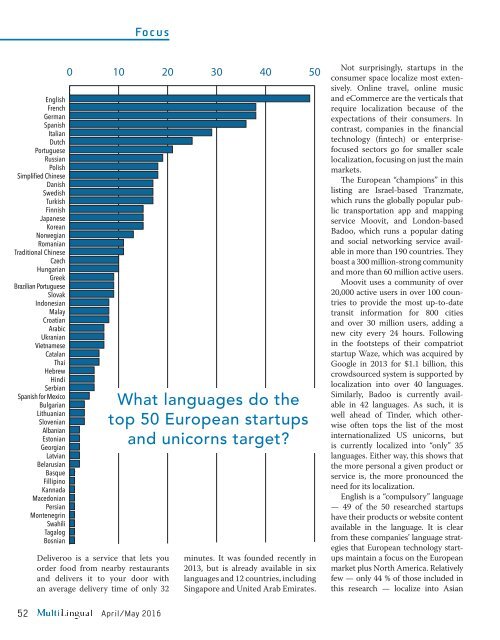Localization
z99kl79
z99kl79
Create successful ePaper yourself
Turn your PDF publications into a flip-book with our unique Google optimized e-Paper software.
Focus<br />
English<br />
French<br />
German<br />
Spanish<br />
Italian<br />
Dutch<br />
Portuguese<br />
Russian<br />
Polish<br />
Simplified Chinese<br />
Danish<br />
Swedish<br />
Turkish<br />
Finnish<br />
Japanese<br />
Korean<br />
Norwegian<br />
Romanian<br />
Traditional Chinese<br />
Czech<br />
Hungarian<br />
Greek<br />
Brazilian Portuguese<br />
Slovak<br />
Indonesian<br />
Malay<br />
Croatian<br />
Arabic<br />
Ukranian<br />
Vietnamese<br />
Catalan<br />
Thai<br />
Hebrew<br />
Hindi<br />
Serbian<br />
Spanish for Mexico<br />
Bulgarian<br />
Lithuanian<br />
Slovenian<br />
Albanian<br />
Estonian<br />
Georgian<br />
Latvian<br />
Belarusian<br />
Basque<br />
Fillipino<br />
Kannada<br />
Macedonian<br />
Persian<br />
Montenegrin<br />
Swahili<br />
Tagalog<br />
Bosnian<br />
0 10 20 30 40 50<br />
Deliveroo is a service that lets you<br />
order food from nearby restaurants<br />
and delivers it to your door with<br />
an average delivery time of only 32<br />
What languages do the<br />
top 50 European startups<br />
and unicorns target?<br />
minutes. It was founded recently in<br />
2013, but is already available in six<br />
languages and 12 countries, including<br />
Singapore and United Arab Emirates.<br />
Not surprisingly, startups in the<br />
consumer space localize most extensively.<br />
Online travel, online music<br />
and eCommerce are the verticals that<br />
require localization because of the<br />
expectations of their consumers. In<br />
contrast, companies in the financial<br />
technology (fintech) or enterprisefocused<br />
sectors go for smaller scale<br />
localization, focusing on just the main<br />
markets.<br />
The European “champions” in this<br />
listing are Israel-based Tranzmate,<br />
which runs the globally popular public<br />
transportation app and mapping<br />
service Moovit, and London-based<br />
Badoo, which runs a popular dating<br />
and social networking service available<br />
in more than 190 countries. They<br />
boast a 300 million-strong community<br />
and more than 60 million active users.<br />
Moovit uses a community of over<br />
20,000 active users in over 100 countries<br />
to provide the most up-to-date<br />
transit information for 800 cities<br />
and over 30 million users, adding a<br />
new city every 24 hours. Following<br />
in the footsteps of their compatriot<br />
startup Waze, which was acquired by<br />
Google in 2013 for $1.1 billion, this<br />
crowdsourced system is supported by<br />
localization into over 40 languages.<br />
Similarly, Badoo is currently available<br />
in 42 languages. As such, it is<br />
well ahead of Tinder, which otherwise<br />
often tops the list of the most<br />
internationalized US unicorns, but<br />
is currently localized into “only” 35<br />
languages. Either way, this shows that<br />
the more personal a given product or<br />
service is, the more pronounced the<br />
need for its localization.<br />
English is a “compulsory” language<br />
— 49 of the 50 researched startups<br />
have their products or website content<br />
available in the language. It is clear<br />
from these companies’ language strategies<br />
that European technology startups<br />
maintain a focus on the European<br />
market plus North America. Relatively<br />
few — only 44 % of those included in<br />
this research — localize into Asian<br />
52 April/May 2016


